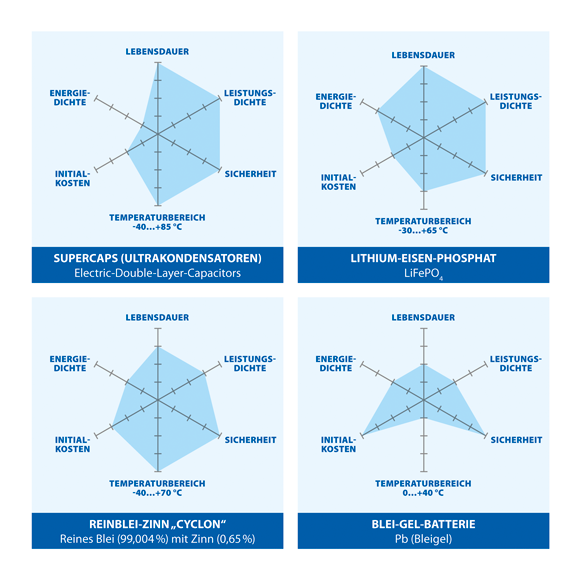|
Durable, secure DC UPS systems Information on choosing the right battery technologyIn industry and for medical technology, failsafe systems and components are becoming more and more important for trouble-free operations. An important part of this is a high-performance uninterruptible power supply (UPS) to provide protection against power failures, flicker, fluctuations and voltage drops.The requirements for an uninterruptible DC power supply are diverse, and include low cost, long service life, flexibility and reliability. Precise analysis of the application, detailed knowledge of different battery technologies and an examination of the total cost of ownership are therefore necessary when making a selection. Different battery technologiesThe following battery technologies are primarily used in DC UPS systems:
• Supercaps (ultracapacitors)
• Lithium ion batteries (esp. lithium iron phosphate LiFePO4)
• Pure lead-tin batteries (Cyclon batteries)
• Classical lead-gel batteries
Each of these technologies offers a variety of properties.  | | Properties of the different battery technologies. |
|
Dimensioning a DC UPS for a specific applicationIf a DC UPS is to be dimensioned correctly, the following question must first be answered:
Which components of the system must actually be protected in the event of a power failure?
► Example: In an industrial PC system, an integrated display may account for 40 percent of energy consumption. If, in case of a power failure, it is not necessarily the display but only the computer unit that must continue to operate, up to 40 percent battery capacity (= space and cost) can be saved.
The required battery capacity is calculated by multiplying the defined power consumption in UPS operation by the bridging time desired. Depending on the application, the required bridging time can vary from seconds to minutes to hours.
► Example: If a system with an average power consumption of 100W is to be bridged for 80 seconds during a power failure, a battery capacity of 8000Ws or 8000J is required. For longer bridging times, the calculation will move accordingly into the Wh region.
However, the actual battery capacity required is higher than the nominal value determined purely by calculation, because:
• Efficiency losses and lower voltages due to temperature changes must be allowed for.
• Battery cells, depending on the discharge current and temperature, have different usable capacities, and also age.
• The battery capacity shown on the cells is not fully usable, because compliance with the limits for overvoltage (OV) and undervoltage (UV) always requires a certain amount of residual capacity.
• Power reserves should also be taken into consideration.
Power supply manufacturers like Bicker Elektronik use specially programmed calculation tables and formulas to take into account all these parameters and safety buffers when calculating the required capacity. Make the right choiceThere are other factors to consider when selecting a suitable battery technology. These include:
• Influence of the operating temperature
• Energy and power density
• Control and charging technology of DC UPS systems
• PowerSharing to avoid oversizing
• Charging method and service life
Due to the very different requirement profiles for an uninterruptible DC power supply, when selecting a DC UPS system, an individual design-in consultation and application-specific concept should always be carried out together with the power supply manufacturer.
|
|
|














